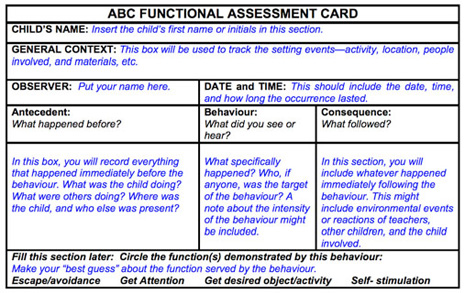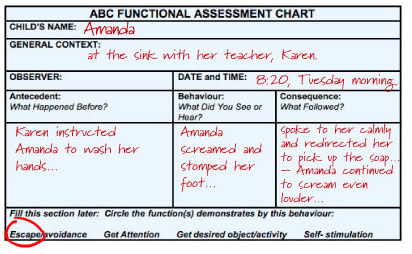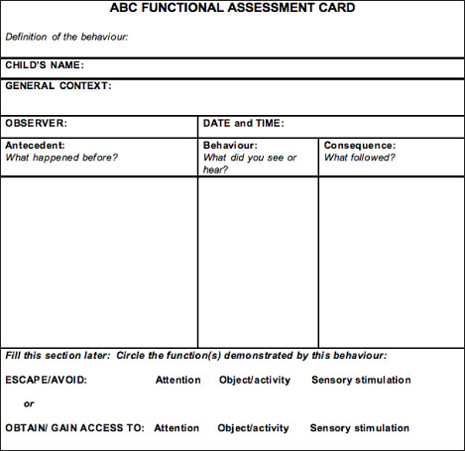Whether you are a parent, teacher or early childhood professional, understanding and changing your child’s behaviour is never simple. However, describing the behaviour that concerns you, and gathering good information about when it occurs and under what conditions, is the first step to success.
The ABC Functional Assessment Card is a recording system that is extremely valuable in helping you gather and analyze information you need to help change behaviour.
The first step is to carefully select and “define” a specific problem behaviour – the one you are concerned about and would like to change. Defining a behaviour requires that you describe exactly what you see and/or hear. Your definition should be specific, observable, and measurable. You may find it helpful to print the definition of the behaviour right on the top of the ABC card before copying the cards.
The next step is to fill out a separate ABC Card each time the defined behaviour occurs. The example below shows you how to do this. If the behaviour often occurs, you will want to have a greater number of cards handy. Other adults can also fill out the cards.
On a busy day, you will sometimes miss recording an occurrence. Do not worry about it. Just complete the cards as often as you can.
How do I complete the cards?
The cards are quite simple to complete. Here is how to do it:

For example, Amanda is having great difficulty with the hand washing routine and her tantrums are very disruptive. The problem seems to be getting worse. We will begin by defining the problem behaviour (e.g., screaming and stomping of feet). Next, we will gather the information about each incident using the ABC card.
Here is what it looks like when one incident is recorded:

You will need to record at least 5 or 6 incidents to make sure you have enough information. It also helps if other people record the incidents as well. At this point, you will probably have enough information to analyze.
What should I look for when analyzing the cards?
It is important to look for any patterns or common trends, such as patterns in the days of the week, or times of the day when the problem behaviour occurs. You will also want to think about when the behaviour does not occur. This may give you additional clues about contributing factors.
Questions to ask include:
- Is the behaviour happening during the same activity and/or with the same materials?
- Does the behaviour occur with specific people? (e.g., mom, child care teachers)
- Are there certain events or conditions that lead up to or happen ¬before the behaviour?
- Is there a consistent consequence?
- Does the behaviour stop after a particular consequence? If this is consistent, does this mean anything about the function or purpose of the behaviour?
- Consider other personal factors that may be influencing the behaviour such as illness, tiredness, or hunger.
Analyzing all the information that you gather and record using the ABC Assessment Cards will allow you to make a “best guess” regarding the function or purpose of the behaviour. Your next task will be to plan for change!

